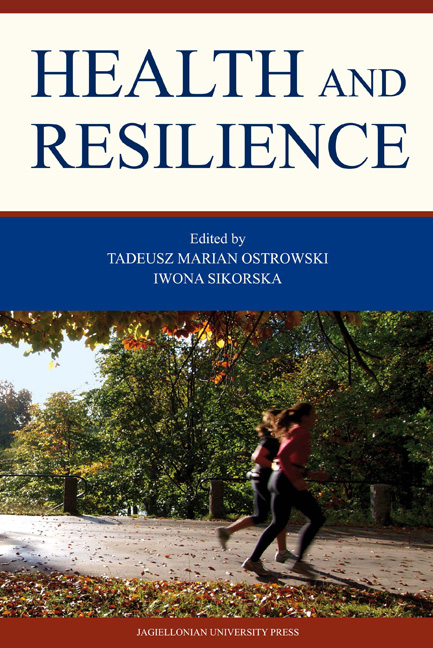Book contents
- Frontmatter
- TABLE OF CONTENTS
- Introduction
- I SOCIAL AND METHODOLOGICAL CONTECTS OF RESILIENCE
- Resilience in the light of research and theoretical reflection
- Naturalism, normativism and Havi Carel's phenomenological approach to health and illness
- Testing the sense of identity in people with highly functioning autism as theory-methodological problem
- “The beneficial life stories.” Health and mental resilience from the narrative perspective
- II RESILIENCE IN DEVELOPMENT
- III RESILIENCE AND DISEASE
- List of Authors
Testing the sense of identity in people with highly functioning autism as theory-methodological problem
from I - SOCIAL AND METHODOLOGICAL CONTECTS OF RESILIENCE
Published online by Cambridge University Press: 05 December 2014
- Frontmatter
- TABLE OF CONTENTS
- Introduction
- I SOCIAL AND METHODOLOGICAL CONTECTS OF RESILIENCE
- Resilience in the light of research and theoretical reflection
- Naturalism, normativism and Havi Carel's phenomenological approach to health and illness
- Testing the sense of identity in people with highly functioning autism as theory-methodological problem
- “The beneficial life stories.” Health and mental resilience from the narrative perspective
- II RESILIENCE IN DEVELOPMENT
- III RESILIENCE AND DISEASE
- List of Authors
Summary
Abstract
This article refers to the paradigm of cognitive and developmental psychology and triadic concept of identity of L. Witkowski. It presents basic problems referring to, among other things, the psychological characterizing of sense of identity in people with highly functioning autism.
Referring to contemporary, existing in literature theoretic solutions and empiric analysis of operating of people with highly functioning autism, in this article there will be discussed briefly three suggested by Witkowski scopes of identity – that is competence, concept and condition. The last part of the article will be dedicated to the example case of adolescent with highly functioning autism and pointing at diagnostic and interpretation difficulties which appeared while using commonly used psychological tools in psychological guidance.
Key words: high-functioning autism, sense of identity
Introduction
The end of the 20th century has brought remarkable advances in the research and theory concerning the issues of autism. Researchers representing various theoretical frameworks contributed to a more comprehensive approach to the disorder, which allowed to adequately describe the autism spectrum disorders, as well as to pick up the complex issue of identity research in people with high-functioning autism.
The descriptions of the autism spectrum disorders contained in two international classifications – ICD-10 and DSM-IV-TR – are currently convergent. However, the diagnostic criteria of the Asperger syndrome in the aforementioned classifications differ markedly in some respects from criteria put forward by individual researchers, particularly with respect to the development of speech and language.
- Type
- Chapter
- Information
- Health and Resilience , pp. 39 - 56Publisher: Jagiellonian University PressPrint publication year: 2014



